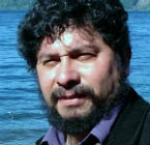Campfire
The fire weighs less than silence, papay, your
thick shadow that burns
among wet logs;
less than the silence of night
and sleep,
the light that shines
off birds and rivers.
“May the fire be your brother,” it speaks, it lights up
your mouth,
the story of fallen plains
and mountains,
the war between gods, serpents
of silver,
the passage of men
through lightning and blood.
You hear the gallop of the generations,
the names buried
with pitchers and fruits,
the tear, the clamor of slow caravans
escaping to the hills of death and life.
You hear the puma strike
the deer,
the trout leap into blue
rivers;
you hear the song of birds, you foretell
you hide behind ferns
and flowering fuchsias.
Now you breathe the dust of the nguillatunes,
the machi cutting the throat
of the chosen ram;
now you breathe the smoke before the rehue, the fire
that burns the bones of the long sacrifice.
“May the fire be your brother,” you say returning,
may the wide sun of the day
reunite brothers and sisters;
may the fire be your brother, papay, the memory
that silently embraces the shadow
and the light.
*Papay is a term of endearment for elder women in Huilliche.
Sister
Those eyes the color of color
from a gray height, watch
bellflowers, trickling water.
Does the silence come from the wind at this hour or
is it the drunken bees
bringing honey and blood
to the hive of your temples?
Because the water is beautiful,
and the sky is beautiful
and both are good friends – she says.
Because the light is my soul in the star,
and my breasts are fountains of light.
Because in silence we know what we are:
the eagle and the swan,
the deer and the puma,
mountains, spring and wind,
sowing the seeds of eternity.
*The lines in italics are by the poet Pablo de Rokha.
Translated by Arthur Dixon



